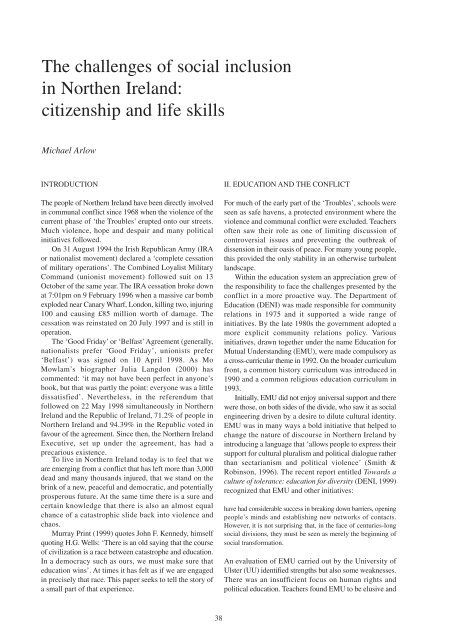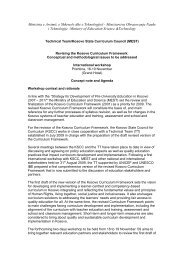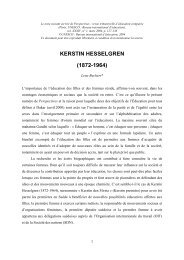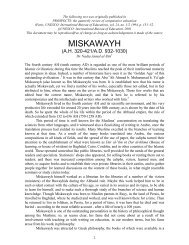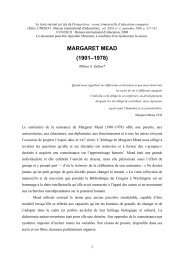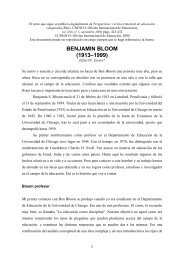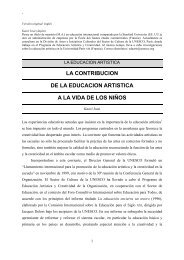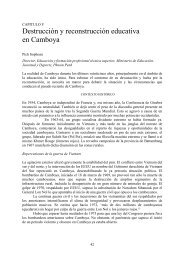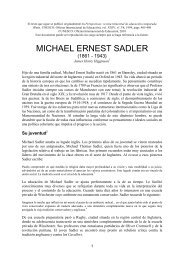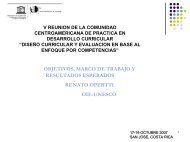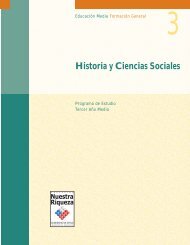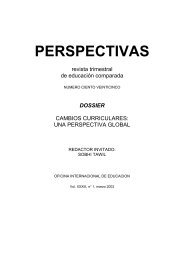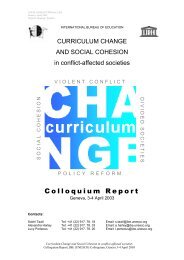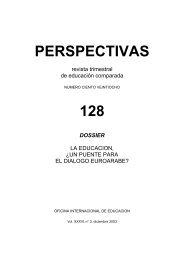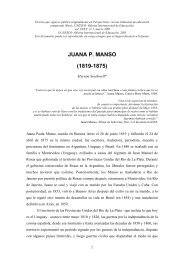Curriculum Change and Social Inclusion - International Bureau of ...
Curriculum Change and Social Inclusion - International Bureau of ...
Curriculum Change and Social Inclusion - International Bureau of ...
You also want an ePaper? Increase the reach of your titles
YUMPU automatically turns print PDFs into web optimized ePapers that Google loves.
The challenges <strong>of</strong> social inclusion<br />
in Northen Irel<strong>and</strong>:<br />
citizenship <strong>and</strong> life skills<br />
Michael Arlow<br />
INTRODUCTION<br />
The people <strong>of</strong> Northern Irel<strong>and</strong> have been directly involved<br />
in communal conflict since 1968 when the violence <strong>of</strong> the<br />
current phase <strong>of</strong> ‘the Troubles’ erupted onto our streets.<br />
Much violence, hope <strong>and</strong> despair <strong>and</strong> many political<br />
initiatives followed.<br />
On 31 August 1994 the Irish Republican Army (IRA<br />
or nationalist movement) declared a ‘complete cessation<br />
<strong>of</strong> military operations’. The Combined Loyalist Military<br />
Comm<strong>and</strong> (unionist movement) followed suit on 13<br />
October <strong>of</strong> the same year. The IRA cessation broke down<br />
at 7:01pm on 9 February 1996 when a massive car bomb<br />
exploded near Canary Wharf, London, killing two, injuring<br />
100 <strong>and</strong> causing £85 million worth <strong>of</strong> damage. The<br />
cessation was reinstated on 20 July 1997 <strong>and</strong> is still in<br />
operation.<br />
The ‘Good Friday’ or ‘Belfast’Agreement (generally,<br />
nationalists prefer ‘Good Friday’, unionists prefer<br />
‘Belfast’) was signed on 10 April 1998. As Mo<br />
Mowlam’s biographer Julia Langdon (2000) has<br />
commented: ‘it may not have been perfect in anyone’s<br />
book, but that was partly the point: everyone was a little<br />
dissatisfied’. Nevertheless, in the referendum that<br />
followed on 22 May 1998 simultaneously in Northern<br />
Irel<strong>and</strong> <strong>and</strong> the Republic <strong>of</strong> Irel<strong>and</strong>, 71.2% <strong>of</strong> people in<br />
Northern Irel<strong>and</strong> <strong>and</strong> 94.39% in the Republic voted in<br />
favour <strong>of</strong> the agreement. Since then, the Northern Irel<strong>and</strong><br />
Executive, set up under the agreement, has had a<br />
precarious existence.<br />
To live in Northern Irel<strong>and</strong> today is to feel that we<br />
are emerging from a conflict that has left more than 3,000<br />
dead <strong>and</strong> many thous<strong>and</strong>s injured, that we st<strong>and</strong> on the<br />
brink <strong>of</strong> a new, peaceful <strong>and</strong> democratic, <strong>and</strong> potentially<br />
prosperous future. At the same time there is a sure <strong>and</strong><br />
certain knowledge that there is also an almost equal<br />
chance <strong>of</strong> a catastrophic slide back into violence <strong>and</strong><br />
chaos.<br />
Murray Print (1999) quotes John F. Kennedy, himself<br />
quoting H.G. Wells: ‘There is an old saying that the course<br />
<strong>of</strong> civilization is a race between catastrophe <strong>and</strong> education.<br />
In a democracy such as ours, we must make sure that<br />
education wins’. At times it has felt as if we are engaged<br />
in precisely that race. This paper seeks to tell the story <strong>of</strong><br />
a small part <strong>of</strong> that experience.<br />
38<br />
II. EDUCATION AND THE CONFLICT<br />
For much <strong>of</strong> the early part <strong>of</strong> the ‘Troubles’, schools were<br />
seen as safe havens, a protected environment where the<br />
violence <strong>and</strong> communal conflict were excluded. Teachers<br />
<strong>of</strong>ten saw their role as one <strong>of</strong> limiting discussion <strong>of</strong><br />
controversial issues <strong>and</strong> preventing the outbreak <strong>of</strong><br />
dissension in their oasis <strong>of</strong> peace. For many young people,<br />
this provided the only stability in an otherwise turbulent<br />
l<strong>and</strong>scape.<br />
Within the education system an appreciation grew <strong>of</strong><br />
the responsibility to face the challenges presented by the<br />
conflict in a more proactive way. The Department <strong>of</strong><br />
Education (DENI) was made responsible for community<br />
relations in 1975 <strong>and</strong> it supported a wide range <strong>of</strong><br />
initiatives. By the late 1980s the government adopted a<br />
more explicit community relations policy. Various<br />
initiatives, drawn together under the name Education for<br />
Mutual Underst<strong>and</strong>ing (EMU), were made compulsory as<br />
a cross-curricular theme in 1992. On the broader curriculum<br />
front, a common history curriculum was introduced in<br />
1990 <strong>and</strong> a common religious education curriculum in<br />
1993.<br />
Initially, EMU did not enjoy universal support <strong>and</strong> there<br />
were those, on both sides <strong>of</strong> the divide, who saw it as social<br />
engineering driven by a desire to dilute cultural identity.<br />
EMU was in many ways a bold initiative that helped to<br />
change the nature <strong>of</strong> discourse in Northern Irel<strong>and</strong> by<br />
introducing a language that ‘allows people to express their<br />
support for cultural pluralism <strong>and</strong> political dialogue rather<br />
than sectarianism <strong>and</strong> political violence’ (Smith &<br />
Robinson, 1996). The recent report entitled Towards a<br />
culture <strong>of</strong> tolerance: education for diversity (DENI, 1999)<br />
recognized that EMU <strong>and</strong> other initiatives:<br />
have had considerable success in breaking down barriers, opening<br />
people’s minds <strong>and</strong> establishing new networks <strong>of</strong> contacts.<br />
However, it is not surprising that, in the face <strong>of</strong> centuries-long<br />
social divisions, they must be seen as merely the beginning <strong>of</strong><br />
social transformation.<br />
An evaluation <strong>of</strong> EMU carried out by the University <strong>of</strong><br />
Ulster (UU) identified strengths but also some weaknesses.<br />
There was an insufficient focus on human rights <strong>and</strong><br />
political education. Teachers found EMU to be elusive <strong>and</strong>


